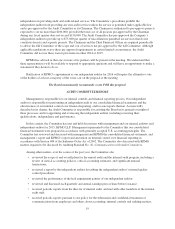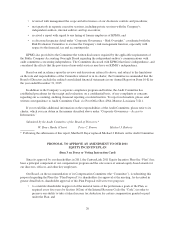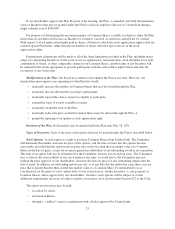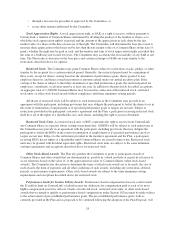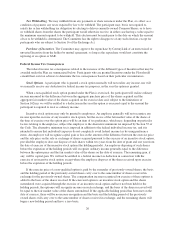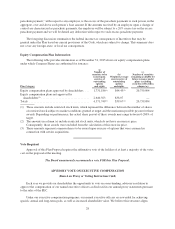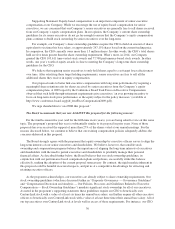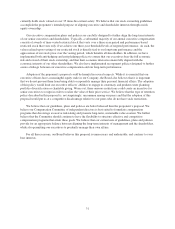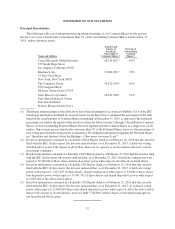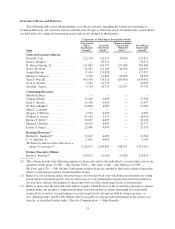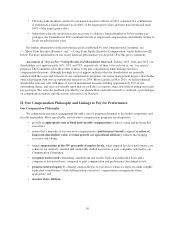CenturyLink 2015 Annual Report Download - page 38
Download and view the complete annual report
Please find page 38 of the 2015 CenturyLink annual report below. You can navigate through the pages in the report by either clicking on the pages listed below, or by using the keyword search tool below to find specific information within the annual report.Stock Appreciation Rights. Generally, a participant who is granted a stock appreciation right under the Plan
will not recognize any taxable income at the time of the grant. The participant will recognize ordinary income
upon exercise equal to the amount of cash or the fair market value of the shares received on the day they are
received.
In general, there are no federal income tax deductions allowed to CenturyLink upon the grant of stock
appreciation rights. Upon the exercise of the stock appreciation right, however, we will be entitled to a deduction
equal to the amount of ordinary income that the participant is required to recognize as a result of the exercise,
provided that the deduction is not otherwise disallowed under Section 162(m).
Restricted Stock. Unless the participant makes an election to accelerate recognition of the income to the
date of grant under Section 83(b) of the Code (as described below), the participant will not recognize income,
and we will not be allowed a tax deduction, at the time the restricted stock award is granted. When the
restrictions lapse, the participant will recognize ordinary income equal to the fair market value of the shares as of
that date, and we will be allowed a corresponding federal income tax deduction at that time, subject to any
applicable limitations under Section 162(m). If the participant files an election under Section 83(b) within
30 days of the date of grant of restricted stock, the participant will recognize ordinary income as of the date of the
grant equal to the fair market value of the shares as of that date, and we will be allowed a corresponding federal
income tax deduction at that time, subject to any applicable limitations under Section 162(m). Any future
appreciation in the shares will be taxable to the participant at capital gains rates. If the shares are later forfeited,
however, the participant will not be able to recover the tax previously paid pursuant to a Section 83(b) election.
Restricted Stock Units. A participant will not be deemed to have received taxable income upon the grant of
restricted stock units. The participant will be deemed to have received taxable ordinary income at such time as
shares are distributed with respect to the restricted stock units in an amount equal to the fair market value of the
shares distributed to the participant. Upon the distribution of shares to a participant with respect to restricted
stock units, we will ordinarily be entitled to a deduction for federal income tax purposes in an amount equal to
the taxable ordinary income of the participant, subject to any applicable limitations under Section 162(m). The
basis of the shares received will equal the amount of taxable ordinary income recognized by the participant upon
receipt of such shares.
Other Stock-Based Awards. Generally, a participant who is granted an other stock-based award under the
Plan will recognize ordinary income at the time the cash or Common Shares associated with the award are
received. If shares are received, the ordinary income will be equal to the excess of the fair market value of the
shares received over any amount paid by the participant in exchange for the shares.
In the year that the participant recognizes ordinary taxable income in respect of such award, we will be
entitled to a deduction for federal income tax purposes equal to the amount of ordinary income that the
participant is required to recognize, provided that the deduction is not otherwise disallowed under
Section 162(m).
Section 409A. If any Incentive constitutes non-qualified deferred compensation under Section 409A of the
Code, it will be necessary that the Incentive be structured to comply with Section 409A to avoid the imposition
of additional tax, penalties, and interest on the participant.
Tax Consequences of a Change of Control. If, upon a change of control of CenturyLink, the exercisability,
vesting, or payout of an Incentive is accelerated, any excess on the date of the change of control of the fair
market value of the shares or cash issued under accelerated Incentives over the purchase price of such shares, if
any, may be characterized as “parachute payments” (within the meaning of Section 280G of the Code) if the sum
of such amounts and any other such contingent payments received by the employee exceeds an amount equal to
three times the “base amount” for such employee. The base amount generally is the average of the annual
compensation of the employee for the five years preceding such change in ownership or control. An “excess
27




